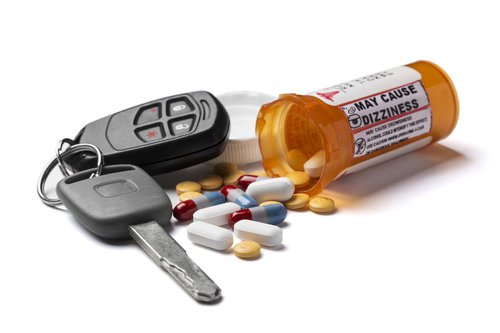Dangers of Driving After Taking Prescription Drugs or Over-the-Counter Medicines

Most Toronto area drivers know that they can be charged with "driving under the influence" (DUI) if caught driving while impaired by drugs. However, many drivers are not aware that Ontario DUI laws also cover impairment by prescription drugs and over-the-counter medicines.
This means that if Ontario police believe that your driving capabilities have been impaired by prescription drugs or over-the-counter medicines, they can charge you with drug-impaired driving. This specific DUI charge is typically brought based on physical evidence and witness observation, though blood concentration-related test results can be introduced as evidence, as well.
A conviction for drug-impaired driving—even if only based on prescription or over-the-counter medications—carries the same severe penalties and a criminal record as other DUI convictions. Thus, if you are facing drug-impaired driving charges based on medications, make sure that you secure the best criminal defence possible, such as that offered by the skilled lawyers at TorontoDUI.
The Reasoning Behind Medication-Based DUI
The Canadian government recently reported that the "percentage of Canadian drivers killed in vehicle crashes who test positive for drugs now actually exceeds the number who test positive for alcohol. Canadian researchers have not delineated what percentage of these fatalities may have been caused by legal medications, but studies show that many prescription and over-the-counter drugs can cause many of the same assortment of symptoms that impair drivers under the influence of alcohol and illegal drugs.
These symptoms can include:
- Drowsiness
- Dizziness
- Delayed reaction times
- Impaired judgement of time and distance
- Decreased coordination
- Blurred vision
- Impaired cognitive functioning
- Euphoria (leading to impaired attention)
Numerous prescription drugs can cause any number of these symptoms even when used as prescribed. Some prescription and over-the-counter medications can cause any number of these symptoms when dosages are exceeded. And mixing alcohol—even, in some cases, small amounts—with many medications can cause such symptoms and/or turbocharge them.
Opioid-based prescription drugs and other depressants commonly cause such impairment symptoms, as can some over-the-counter sleeping medicines and antihistamines. While not as common, some over-the-counter cough and upset stomach medications can also cause impairment when dosages are exceeded. In short, it's always best to read the warning labels on all medications, follow the recommended dosages, and avoid driving if the label indicates possible impairment with their specific use. In particular, heed specific warnings against operating machinery and driving motor vehicles.
Note that older drivers may unwittingly be more prone to medication-based impairment , as those over age 65 take an average nine medications per day. Some drug combinations can produce impairing side effects and/or bad reactions. Older drivers are more likely to mistakenly take too much of a prescribed or over-the-counter medication. Slower metabolism in older drivers also means they typically can't break down and process the drugs in their systems, potentially leading to longer periods of impairment.
Medical Marijuana Leading Cause of Medication-Related DUI
Generally speaking, Toronto-area motorists are most likely to be charged with a medication-related DUI based on medical marijuana. While its use and possession are now legal both legally and recreationally, it is still the driver's responsibility to ensure that they are not impaired by the drug and that cannabis blood levels are below the prohibited levels. These levels are:
- Between two and five nanograms of TCH per ml of blood: Warn Range charge (three-day license suspension, $250 fine, and $287 license reinstatement fee for first offence).
- More than five nanograms of THC per ml of blood: Criminal drug-impaired DUI.
- A combination of 50 mg of alcohol per 100 ml of blood combined with 2.5 nanograms or more of TCH per ml of blood: Criminal driving while impaired DUI.
Potential Impacts of Driving While Impaired by Medications
Given the extent to which some prescription drugs and over-the-counter medications can cause impairment, your safety should be your primary concern. Whether by alcohol, recreational drugs, or medications, impaired driving is dangerous. If you or a loved one are injured or killed because of impaired driving, it doesn't matter what ultimately caused the impairment.
Your Secondary consideration should be the law. If you are charged with DUI as a result of impairment by medications, you face the same severe penalties that come with a conviction for any other DUI charges. At a minimum these penalties include:
- Minimum one-year license suspension (followed by $281 fee for license reinstatement).
- Mandatory one-year ignition interlock device upon license reinstatement ($1,500 for the device and $100 per month in testing fees).
- Mandatory medical evaluation to determine your fitness to drive.
- $1,000 to $2,000 fine based on level of impairment
- Potential jail term for up to two years based on mitigating circumstances.
- Mandatory enrollment in Ontario's " Back on Track " education/treatment program (at a cost of more than $650) before license reinstatement.
- Criminal record.
- At least five-years of exceptionally high "risky driver" insurance rates after getting relicensed.
Whatever the Impairment, Consult with TorontoDUI for Your DUI Defence
If you are charged in the Greater Toronto Area for a DUI because of prescription drug or over-the-counter medicines, seek out the service of an experienced DUI lawyer. Experienced Ontario DUI lawyers are highly adept at strategizing a defence that can lead to withdrawn charges, reduced charges, mitigated penalties, dismissal, acquittal or other favorable outcome.
Defence tactics for a drug impaired DUI usually differ from those used to defend against alcohol impaired DUI cases. The basis for any drug impaired DUI tends to be more subjective than that of an alcohol impaired DUI, a factor that holds especially true for DUIs based on medications. Not only do Crown prosecutors have to prove that your driving was impaired, but also that the prescription drugs or over-the-counter medications can cause impairment at the alleged dosage you took them. Charges laid solely on a certified drug recognition expert (DRE) evaluation are open to a wide variety of challenges. Blood samples can also be challenged if the grounds for ordering such were not warranted by the DRE or roadside testing. In short, defence lawyers have numerous tactics they can use to mount a successful defence in medication-related DUIs.
With more than 15 years of successfully defending GTA defendants from all types of DUI charges, the criminal trial DUI lawyers at TorontoDUI have proven highly successful at securing favorable outcomes for their clients. If you or someone you know has been charged with a DUI because of prescription drugs or over-the-counter medications, contact the highly skilled lawyers at TorontoDUI for a free consultation.
